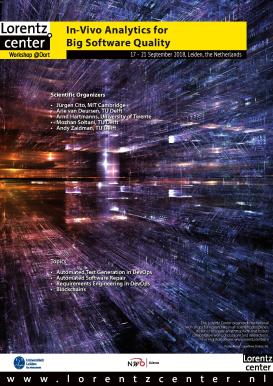In September this year we will organize a Lorentz workshop in the area of software analytics and big software. Lorentz worskhops take place in the Lorentz Center in Leiden, and are somewhat similar to Dagstuhl seminars common in computer science: A small group, a week long retreat, and a focus on interaction and collaboration.

To make this interaction happen, we will experiment with “writer’s and collaborator’s workshops”, inspired by Writer’s Workshops for design patterns.
The workshops we have in mind are short (1-2 hour) sessions, in which a small group of participants (the “discussants”) study one or more papers (proposed by the “author”) in depth.
The primary objective of the session is to provide feedback on the paper to the author. This feedback can relate to any aspect of the paper, such as the experimental setup, the related work, the precise objective, future work that can be carried out to build upon these results, etc.
Besides that, the discussion of each paper serves to explore possible (future) collaborations between any of the participants. Thus, discussants can bring in their own related work, and explore how joining forces can help to further advance the paper’s key results.
The set up of the workshops draws inspiration from Writer’s Workshops commonly used in the design patterns community, which in turn were inspired by workshops int he creative literature community. Pattern workshops have been used to review, evaluate, and improve pattern descriptions. At the same time, the process is akin to a peer review process, except that the objective is not paper selection, but in depth discussion between authors and participants about the key message of a paper.
The specific format we propose is as follows.
The preparation phase aims to match authors and discussants. Using a conference paper management system like EasyChair, the steps include:
- Authors submit the paper they would like to have discussed. This can be a paper currently under review (e.g., their most recent ICSE submissions), a draft version of a paper they would like to submit, or an already published paper they would like to expand (for example for a journal submission).
- All workshop participants can see all papers, and place “bids” on papers they would be particularly interested in studying in advance.
- Papers and participants are grouped into coherent units of 3-4 papers and around 10 participants each.
- Each paper to be discussed gets assigned at least three discussants, based on the groups and bids.
- Discussants study the papers assigned in advance, and compile a short summary of the paper and its main strenghts and points for improvement.
The actual workshops will take 1-2 hours, has up to 10 participants, and includes the discussion of 2-3 papers using 30-45 minutes per paper. We propose the following format:
- For each workshop, we assign one moderator to steer the process.
- One of the discussants is assigned to summarize the paper in around 5 minutes, and explain it to the participants.
- Each discussant explains what he or she particularly liked about the paper
- Each discussant identifies opportunities for possible improvements to the paper.
- Workshop participants who did not review the paper themselves offer their perspectives on the discussion, including areas of further work.
- After this, the author him or herself can step in, and respond to the various points raised.
- As the discussion concludes, the moderator provides a summary of the main findings of the discussion of this paper.
- The process is repeated for the next paper, rotating the author, moderator, and discussant roles.
If you have ever attended a physical PC meeting, you will recognize our attempt to keep some of the good parts of a PC meeting, without the need to make any form of “acceptance” decision.
Since several of the lessons learned during such a session will transcend the individual papers discussed, we will also use plenary sessions in which each of the moderators can summarize the main findings of their workshops, and share them with everyone.
As also emphasized by the patterns community, this format requires a safe setting with participants who trust each other. In particular:
- Papers discussed are confidential: Authors need not be scared that participants “steal” their ideas;
- Feedback is directed at the work rather than the author, preserving the dignity of the author.
Clearly, such a “writers and collaborators workshop” does require work from the participants, both in terms of following the protocol and in preparing the discussions. So we will have to see if it really works or whether some adjustments are necessary.
Yet this format does provide an excellent way to truly engage with each other’s research, and we look forward to the improved research results and future collaborations that will emerge from this.
If you have any experience with formats like this, please let me know!
P.S. We still have some places available in this Lorentz workshop, so contact me if you are interested in participating.